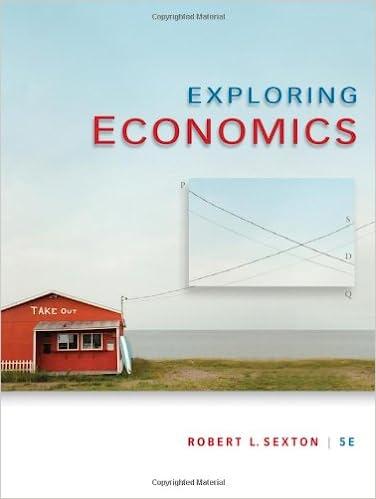Multiple Choice Questions 1. The market system fails to provide the efficient output of public goods because
Question:
1. The market system fails to provide the efficient output of public goods because
a. People place no value on public goods.
b. Private firms cannot restrict the benefits from those goods to consumers who are willing to pay for them.
c. Public enterprises can produce those goods at lower cost than private firms.
d. Public goods create widespread spillover costs.
2. Public goods, like national defense, are usually funded through government because
a. No one cares about them, because they are public.
b. It is prohibitively difficult to withhold national defense from someone unwilling to pay for it.
c. They cost too much for private firms to produce them.
d. They provide benefits only to individuals, and not firms.
3. Adverse selection refers to
a. The phenomenon that occurs when one party in an exchange takes advantage of knowing more than another party.
b. The tendency for individuals to alter their behavior once they are insured against loss.
c. The tendency for individuals to engage in insurance fraud.
d. Both b and c.
4. Which of the following is not true of adverse selection?
a. It can result when both parties to a transaction have little information about the quality of the goods involved.
b. It can cause the quality of goods traded to fall, if quality detection costs are high.
c. It can be a difficult problem to overcome, because it is not individually rational for the transactor with the superior information to provide a truthful and complete disclosure.
d. All of the above are true.
5. If a company offers a medical and dental care plan that offers benefits to all of the members of each employee’s family for a given monthly premium, an employee who is a mother of five children and who has bad teeth who elects that plan would be an illustration of
a. The moral hazard problem.
b. The free-rider problem.
c. The adverse selection problem.
d. The “lemon” problem.
6. If, after you buy a car with air bags, you start to drive recklessly, it would be an illustration of
a. The moral hazard problem.
b. The free-rider problem.
c. The adverse selection problem.
d. The “lemon” problem.
7. In the market for insurance, the moral hazard problem leads
a. Those most likely to collect on insurance to buy it.
b. Those who buy insurance to take fewer precautions to avoid the insured risk.
c. Those with more prior insurance claims to be charged a higher premium.
d. To none of the above.
8. The winner’s curse
a. Is more likely the fewer the bidders.
b. Is more likely the more frequently a good is purchased.
c. Is more likely when a good is being purchased because of its expected future market value.
d. Is a myth.
9. In the analysis of the winner’s curse
a. A bidder who realizes he might be in a winner’s curse situation may bid less as a result.
b. It can be better to lose an auction than to win it.
c. A good bought for its value to the bidder is less likely to be subject to the winner’s curse than a good bought for its expected future market value.
d. All of the above are true.
Fantastic news! We've Found the answer you've been seeking!
Step by Step Answer:
Related Book For 

Question Posted:





